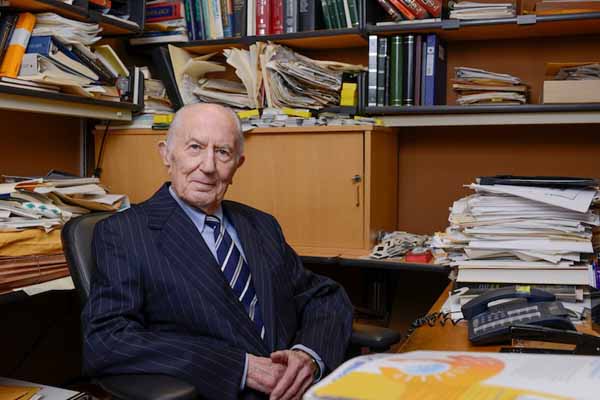
Donald W. Seldin, MD, known as the “intellectual father” of The University of Texas Southwestern Medical Center, died April 25. He was 97.
During his 67-year career at UT Southwestern, Dr. Seldin transformed the school from a ramshackle cluster of buildings into one of the nation’s premier medical centers that has spawned six Nobel Prize winners.
Dr. Seldin accepted an associate professor position in the school’s Department of Medicine in 1951, and within a year was professor and chair of the department. When he stepped down from that role in 1987, the medical faculty was 125 times larger than when he started.
“It is important to recognize the magnitude of Dr. Seldin’s many professional achievements,” UT Southwestern President Daniel K. Podolsky, MD, said in a statement. “In his 36 years as chairman of internal medicine at UT Southwestern, he held a singular view of what an academic department should be and built a world-class department around that vision — which has been emulated across the country.”
In recognition of his many contributions to medicine, Dr. Seldin received the 2015 TMA Distinguished Service Award, TMA’s highest physician honor.
"I regard this award not only as a tribute to my own contributions, but also as a recognition of the achievements and performance of my students, house staff, and fellows,” Dr. Selvin said at the time. Huge numbers of his former students and residents in the TMA House of Delegates rose to honor him — another testament to his legacy.
Dr. Seldin was born in New York City, received his medical degree from Yale University in New Haven, Connecticut in 1943, and completed his residency at nearby New Haven Hospital. After serving in the U.S. Army during World War II, he was appointed in 1944 to the faculty at Yale, where he stayed before moving to Dallas in 1951.
Throughout his career, Dr. Seldin garnered numerous teaching honors, and he was an early member of the prestigious Institute of Medicine (now the National Academy of Medicine), and the American Academy of Arts & Sciences. He also served as president of seven major medical societies, and received six honorary degrees, including one from Yale, and another from the Université de Paris VI – Pierre et Marie Curie.
Photo: UT-Southwestern